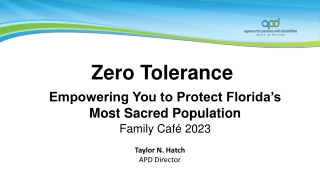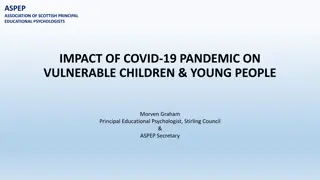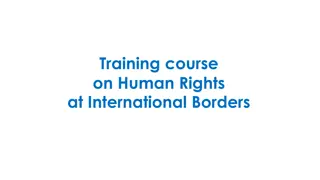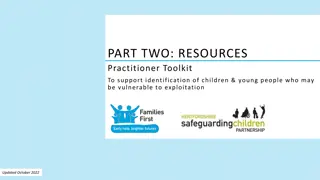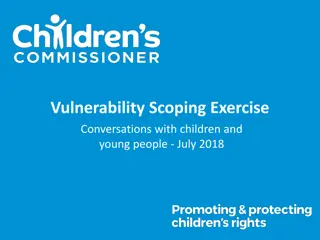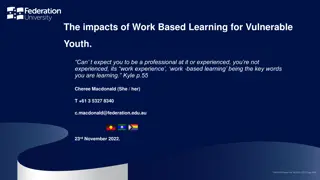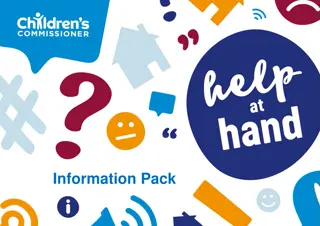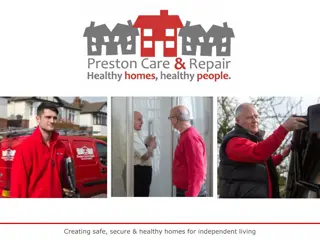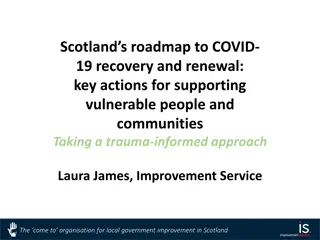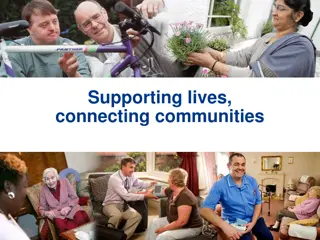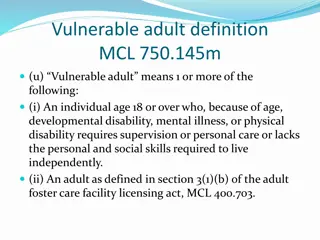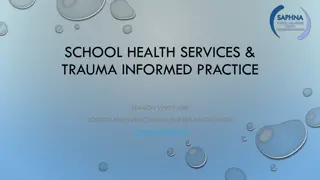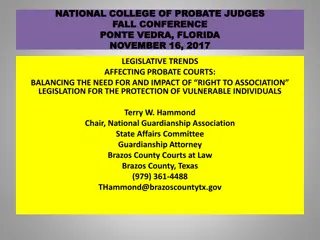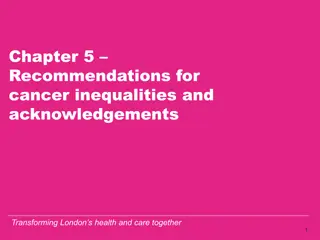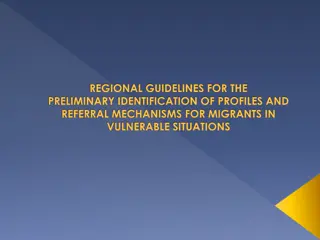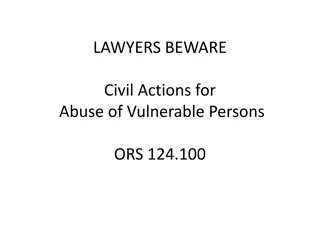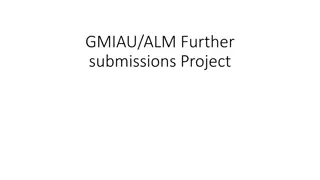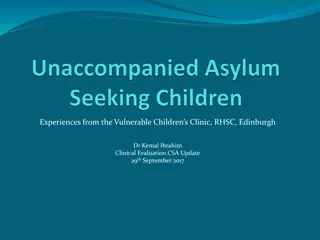Workshop on Identifying and Supporting Individuals in Vulnerable Circumstances
Explore workshop materials designed to aid public service providers in recognizing and assisting service users experiencing vulnerability. The project emphasizes enhancing awareness and understanding to ensure individuals can access public services effectively. Key topics include defining vulnerability, identifying at-risk service users, providing appropriate support, and reflecting on learning for future improvements.
Download Presentation

Please find below an Image/Link to download the presentation.
The content on the website is provided AS IS for your information and personal use only. It may not be sold, licensed, or shared on other websites without obtaining consent from the author. Download presentation by click this link. If you encounter any issues during the download, it is possible that the publisher has removed the file from their server.
E N D
Presentation Transcript
Identifying and supporting individuals in vulnerable circumstances A workshop for public service providers working with service users who may be experiencing vulnerability
Background These workshop materials have been produced as part of a collaborative project involving Prof Gill (University of Glasgow), Prof Creutzfeldt (University of Kent), the Scottish Public Services Ombudsman and the Northern Ireland Public Services Ombudsman. The project s aim was to develop workshop materials, aimed at public service providers, to enhance how service providers identify when service users need extra help to access services and to suggest appropriate ways in which support could be provided to meet such needs. The workshop materials are free to use and aim to help raise awareness, understanding, and support for individuals whose circumstances might lead to them being less able to fully access public services.
The context for this workshop Background to the project
To be human is to be universally and constantly vulnerable I view both vulnerability and dependence as universal These terms do not designate individuals as aberrant and deficient but, quite the contrary, exemplify the human condition Dependency is most evident when we are infants and children, but while we may be more or less dependent at any given stage, dependency is present in some form and to some degree throughout our lives. Professor Martha Fineman
Why it matters the importance of recognising vulnerability and needs 1. Needs not recognised 2. Service fails to meet needs Vulnerability sounds like truth and feels like courage. Truth and courage aren't always comfortable, but they're never weakness. 3. Needs exacerbate and cluster 5. Failure to seek help Bren Brown 4. Distrust, hopelessness, and self-blame
Introduction: workshop content Task 1: What do we mean by vulnerability? Task 2: Identifying service users who may be in vulnerable circumstances Task 3: Providing support to services users identified as being in vulnerable circumstances Task 4: Reflection on learning and planning for change
Introducing our video speakers Perspectives on vulnerability
Task 1: what is vulnerability? This part of the workshop involves: Watching a video showing public service and third sector stakeholders discussing vulnerability and a short animation Reading the extract in the Workbook (see Task 1) in which definitions of vulnerability, examples, and issues are discussed Discussing what vulnerability means to you in the context of your organisation and service users
Definitions of vulnerability What is vulnerability?
Vulnerability and public services Exploring vulnerability
Group discussion Read the Workbook extracts for Task 1 and then discuss the following questions: What aspects of the definitions provided in the video(s) and in the workbook resonated with you? Are the definitions of vulnerability used in consumer settings a helpful starting point? How could they be adapted to suit public services? Is the language of vulnerability appropriate in your context? If not, what language do you use to try to identify service users who may need extra help and support? Can you come up with a working definition of public service users in vulnerable circumstances?
Task 2: identifying service users in vulnerable circumstances This part of the workshop involves: Watching a video showing public service and third sector stakeholders discussing how they identify service users in vulnerable circumstances Reading the extract in the Workbook (see Task 2) in which tips are provided for how to identify individuals who are experiencing vulnerability Discussing what tools you currently use to identify service users in vulnerable circumstances and identifying areas for future development
Identifying vulnerability Identifying service users experiencing vulnerability
Task 2 discussion Read the Workbook extracts for Task 2 and then discuss the following questions: Reflect on challenging experiences you have had in terms of identifying whether someone was in vulnerable circumstances. What makes this issue so challenging? What examples of good practice are you aware of in terms of approaches to identifying people in vulnerable circumstances? To what extent do you currently use either self-disclosure or proactive-identification strategies to identify people? What can you learn from the UK Regulators Network s suggested approach to identifying vulnerability?
Task 3: supporting service users in vulnerable circumstances This part of the workshop involves: Watching a video showing public service and third sector stakeholders discussing how they support service users in vulnerable circumstances Reading the extracts in the Workbook (see Task 3) in which approaches to supporting service users in vulnerable circumstances are discussed Discussing how you currently support service users in vulnerable circumstances and identifying areas for future development
Supporting service users Supporting service users experiencing vulnerability
Group discussion Read the Workbook extracts for Task 3 and then discuss the following questions: What do you do to support service users who have been identified as being in vulnerable circumstances? Are the services you provide designed to meet the needs of people who are in vulnerable circumstances? How could services be designed or adapted to better meet such service users? Is there potential for collaborative working with third sector organisations providing advice and advocacy services to help enhance support for users in vulnerable circumstances?
Task 4: reflecting on learning and planning for change This part of the workshop involves: Watching a video showing public service and third sector stakeholders discussing challenges and priorities for tackling vulnerability Reflecting on and making notes in the Workbook (see Task 4) regarding what you have learned in the course of the workshop Discussing any actions that might arise for you and your organisation after the workshop
Reflecting on learning and change Reflections and taking action
Individual reflection Complete the individual reflection in the Workbook (see Task 4)
Group discussion After you have completed the individual reflection, discuss the following questions: What are the current strengths and weaknesses of your organisation in relation to identifying and supporting service users in vulnerable circumstances? Are there any immediate actions that could be taken and implemented straight away (quick wins)? Are any medium- and longer-term actions required? If so, what are they and how will they be taken forward?
Feedback Thank you for organising and attending this workshop. Please send feedback on how you found the developmental workshop resources and whether you found them useful to: Chris Gill, Professor of Socio-Legal Studies, University of Glasgow, chris.gill@glasgow.ac.uk


